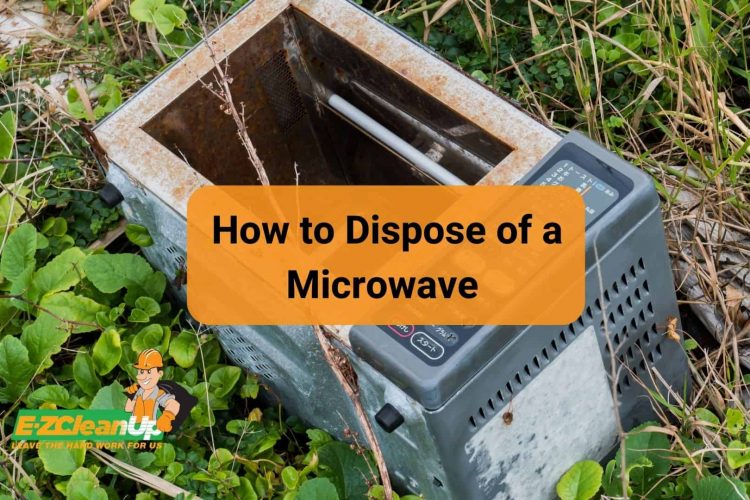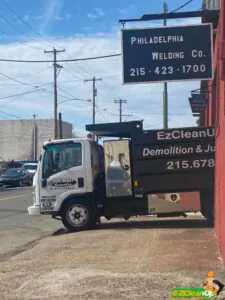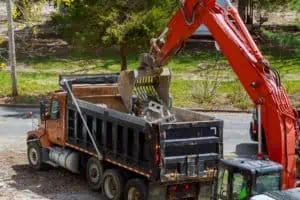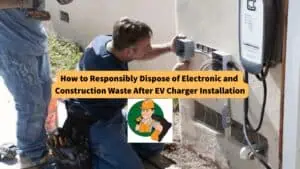Getting rid of an old microwave isn’t as simple as throwing it in the trash. Microwaves contain materials that can be hazardous if not handled properly.
Here are your best options:
- Find a local electronics recycling center.
- Use in-store collection programs at stores.
- Check for stores with recycling offers.
- Check if the manufacturer has return programs.
- Dispose of if broken or donate, sell, or give away if functional.
Learn exactly how to dispose of a microwave in our comprehensive guide, read on!
Find Local Electronic Recycling Centers
Start by looking for local facilities that specialize in recycling electronic appliances. You can do this by searching online for “electronic recycling centers near me” or using dedicated websites like Earth911’s Recycling Search.
Once you’ve identified a few facilities, the next step is to reach out to them. Not all recycling centers accept microwaves, as they require special handling due to their size and the components they contain, such as electronic circuits and potentially harmful chemicals.
Recycling isn’t always free, and some centers might charge a fee to handle certain types of electronic waste. It’s important to ask about any costs involved upfront. Additionally, if transporting the microwave is an issue for you, inquire if the center offers pickup services.
Utilize In-Store Collection Programs
Retail in-store collection programs are a convenient and responsible way to recycle your broken microwave. Many large electronics retailers offer such programs, which give you an easy solution for electronic waste disposal.
Checking with Stores like Staples, Best Buy, and Office Depot
Big retail chains such as Staples, Best Buy, and Office Depot often participate in electronic waste recycling programs. These stores usually accept a variety of items, which makes them a one-stop shop for disposing of unwanted electronics, including microwaves.
Before you haul your microwave to the store, it’s a good idea to visit the store’s website or contact them directly. Their websites typically have detailed information about the types of electronics they accept for recycling.
Each store may have its own set of guidelines and limitations on what they can take. For instance, Best Buy offers a recycling program but may have size or quantity restrictions. Knowing these details beforehand can save you time and effort.
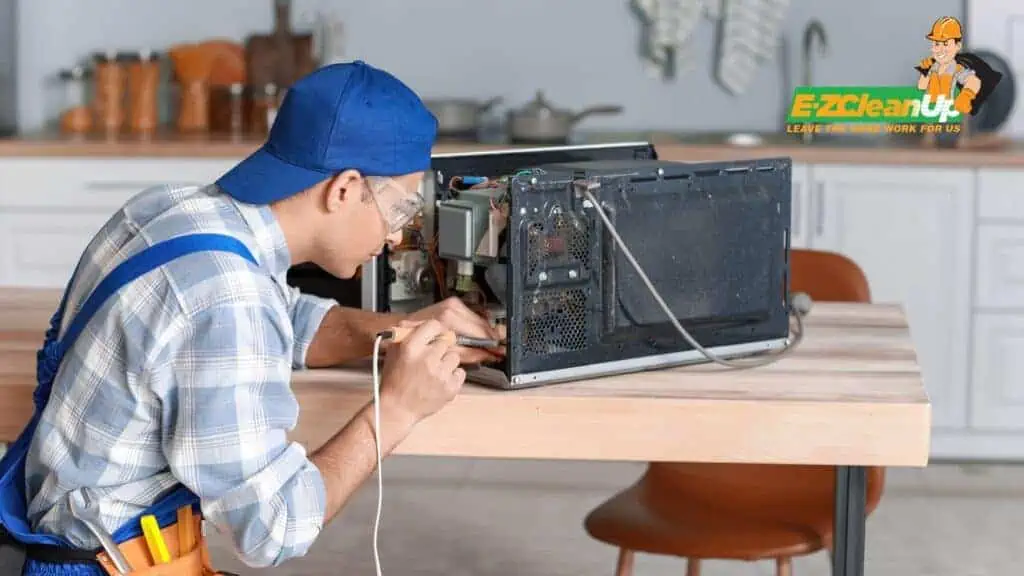
Verify Acceptance and Drop-Off Options
Once you confirm that a store will take your microwave, find out how their drop-off process works. Some stores may have specific drop-off points at their locations, often marked for electronic waste recycling. In certain cases, you might need to bring the microwave to a customer service desk or a designated area in the parking lot.
It’s also important to confirm the store’s operating hours for accepting recyclables and if there are any preparatory steps you need to take, like cleaning the microwave or removing any attached cables or cords.
Explore Store Incentives When Purchasing a New Microwave
When you’re in the market for a new microwave, this can be a good time to responsibly dispose of your old one. Many stores selling appliances offer incentives or services to take your old appliance for recycling when you purchase a new one.
Several home improvement and appliance stores have programs that allow you to recycle your old microwave when buying a new one. These stores understand the need for proper appliance disposal and often partner with recycling companies to ensure the process is handled eco-consciously.
For instance, when you buy a new microwave, they might offer to take your old one back for free or for a minimal fee. This service often includes ensuring that the microwaves are recycled correctly, taking the burden off your shoulders.
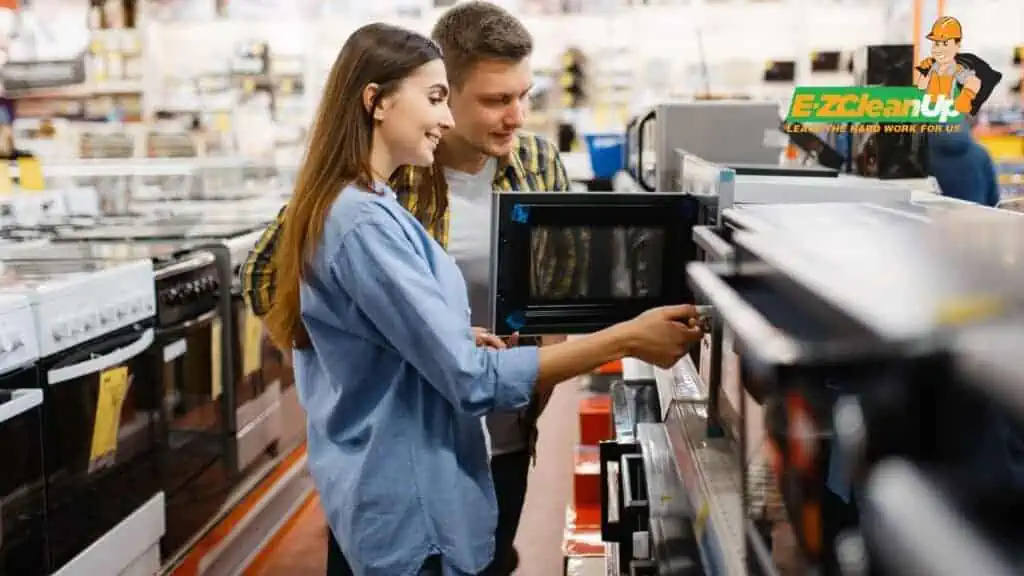
Contact the Manufacturer for Return Programs
Another effective method for disposing of your old microwave is to get in touch with the manufacturer. Many microwave manufacturers have return programs as part of their commitment to responsible end-of-life product management.
Start by checking the website of your microwave’s manufacturer or contacting their customer service for information about their recycling or return programs. These programs are specifically designed to take back used appliances for proper disposal or recycling.
It’s also beneficial to check if the manufacturer’s program refurbishes or recycles parts of the microwave. This approach not only minimizes waste but can also contribute to the creation of new appliances, thereby promoting a circular economy.
One critical aspect to consider when returning a microwave to the manufacturer is the potential cost of shipping. Microwaves are bulky and heavy, which can lead to high shipping costs. Some manufacturers might cover these costs, or they may provide a discount or a voucher as an incentive. In other cases, you might be responsible for paying the shipping fee.
Throwing Away a Broken Microwave
If recycling options aren’t available, or if you’re dealing with a particularly bulky microwave disposal situation, contacting your local trash company is another option. However, this should be considered a last resort due to the environmental impact of adding electronic waste to landfills.
Inquiring About Pickup Services and Guidelines
Begin by reaching out to your local waste management or trash collection company to inquire about their services regarding large or electronic items like microwaves. It’s important to clarify what the process involves.
Some trash companies may have specific guidelines on how to prepare electronic items for pickup. For example, they might instruct you to detach the door or secure the cord in a certain manner. These measures are often in place to ensure safety and ease of handling.
Considering Any Associated Fees
Be aware that disposing of a microwave through regular trash services might come with additional fees. Since microwaves are large, bulky, and contain materials that require special handling, some trash companies charge extra for their disposal as compared to regular trash.
Preparing for the Pickup Service
If you opt for a pickup service, you’ll need to prepare your microwave according to the trash company’s instructions. This could include ensuring that the microwave is clean and free of any food residue and possibly removing the plug or cord.
Place the microwave at the designated pickup area, which might be at the curb or a specific waste collection point. Be sure to do this within the timeline specified by the trash company.
Other Options for Disposing of a Microwave
If you still can’t choose among the abovementioned options for disposing of your microwave, you may want to consider the following alternatives:
Consider Hiring a Junk Removal Company
First off, you may want to hire a professional junk removal company like EZ CleanUp. This can be particularly useful if you have multiple appliances to dispose of or if the logistics of transporting a heavy microwave are challenging.
Junk removal companies specialize in the removal and disposal of various types of waste, including large and bulky items like appliances. They can be a convenient solution as they typically handle all aspects of the removal and disposal process, saving you a ton of time and effort.
Reusing a Working Microwave
If your microwave is still in good working condition, but you’re looking to upgrade, selling it can be a great way to ensure it finds a new home and stays out of the landfill. Not only does this approach support the environment by promoting reuse, but it can also help you financially.
The key to successfully selling your microwave is effective advertising. Start by determining the best platform to reach potential buyers. Online marketplaces like eBay, Craigslist, and Facebook Marketplace are popular choices. You can also consider local classified ads or community bulletin boards.
Being transparent about the condition of the microwave builds trust with potential buyers. Price your microwave reasonably, considering its age, brand, and condition. You might want to research similar models online to get an idea of the going rate. A competitively priced item tends to sell faster.

Donate the Working Microwave
When looking to donate your microwave, consider various organizations and institutions that might benefit from it. Schools, churches, shelters, and community centers often need these appliances for their kitchens or for supporting community programs.
Before donating, reach out to these organizations to see if they have a need for a microwave. Some organizations might have specific requirements for donations (e.g., size, brand, or condition of the microwave), so it’s essential to provide details about your appliance.
Take the Microwave to an Appliance Repair Shop
If your microwave is no longer needed but still functional, or if it’s broken but could be fixed, taking it to a local appliance repair shop can be an excellent way to dispose of it responsibly. Repair shops can either refurbish the appliance for resale or use its parts for repairing other machines.
Appliance repair shops often look for used microwaves, either to fix and resell or to dismantle for parts. A working microwave can be a valuable find for these shops, as they can easily refurbish and sell it at a lower cost than new models.
Even if your microwave isn’t working, it may still have components like the turntable, motor, or electronic parts that are in good condition and can be used to repair other appliances.
Attempt DIY Repairs by Referring to the Instruction Manual
If your microwave isn’t working as it should, but you’re not ready to give it up just yet, attempting some do-it-yourself (DIY) repairs can be a good option. Not only does this approach save you the cost of buying a new appliance, but it also extends the life of your microwave.
Most microwave instruction manuals come with a troubleshooting section that addresses common issues such as the appliance not heating, making strange noises, or the turntable not spinning. These sections provide initial diagnostic steps and potential solutions. For instance, a microwave that’s not heating might simply be due to a blown fuse or a faulty door switch, which can often be replaced relatively easily.
The manual typically includes clear instructions and diagrams, helping you understand how the microwave operates and how to safely access various components. Additionally, online resources can be invaluable for DIY repairs. Look for forums, DIY repair websites, and instructional videos that might address your specific microwave model and issue.
FAQs – How to Dispose of a Microwave
Can You Put a Microwave in General Waste?
No, it’s not advisable to put a microwave in general waste. Microwaves contain electronic components and sometimes hazardous materials that require special handling. Disposing of a microwave with your regular trash can lead to these materials ending up in landfills.
How to Safely Scrap a Microwave?
To safely scrap a microwave, it’s important to dismantle it properly:
- Unplug and Clean: Ensure the microwave is unplugged and free from dirt and food residues.
- Dismantle Carefully: If you’re experienced with electronics and their safety hazards, you can dismantle the microwave, but be cautious of the high-voltage capacitor, which can retain a charge even when unplugged.
- Separate Parts: Separate the metal, glass, plastic, and electronic components.
- Recycle the Right Parts: Metal parts can often be recycled with regular metal scrap. Electronic components should be taken to an e-waste recycling center.
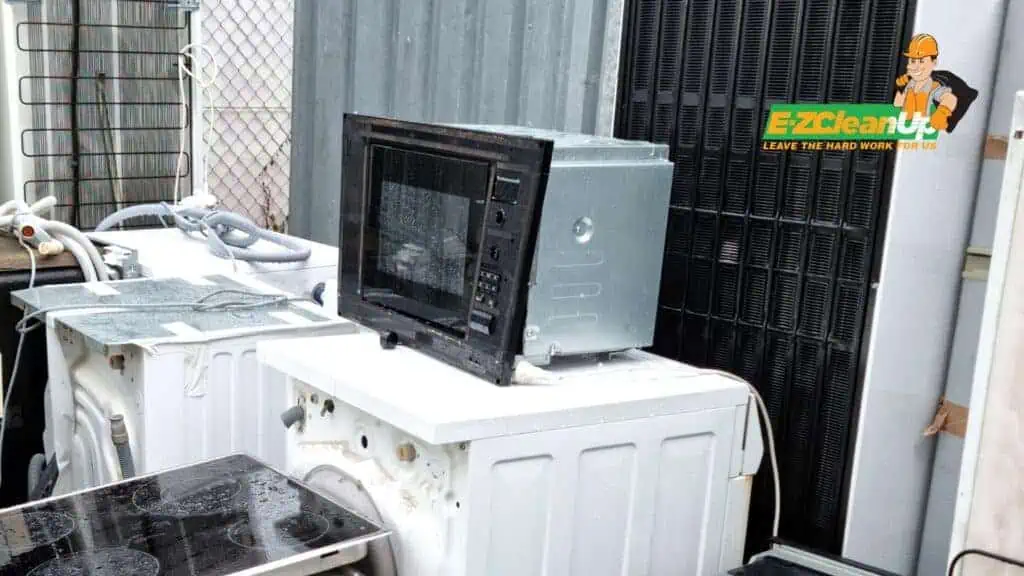
Make Your Microwave Disposal Count
There are various ways to approach microwave disposal: recycling, throwing it away correctly, donating, selling, or even repairing it. When deciding the best course of action for your microwave, consider the appliance’s condition, your personal convenience, and the environmental impact.
Recycling and donating not only prevent waste but also help those in need. If DIY repairs or dropping off at recycling centers isn’t feasible for you, or if the microwave is beyond repair and needs to be discarded, remember that you have more options at your disposal.
For those in the Philadelphia area, EZ CleanUp offers a comprehensive range of services to take the hassle out of appliance and junk removal. We are a licensed and insured junk removal company with a team that is equipped to handle all your junk removal needs, including old microwaves.
Why worry about the details and logistics of microwave disposal when EZ CleanUp can do it for you? We’re just a call away.
Contact us today to find out more about how we can help make your life easier and greener.

